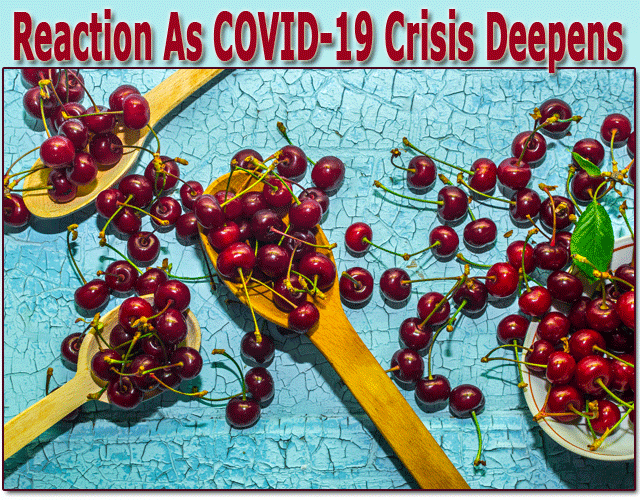 |
 According
to former Trump Presidential Chief Strategist Steven K. Bannon as the
COVID-19 pandemic widens, the deeper issue of globalization emerges, highlighting
that in 2020 China is not only “manufacturer of the world, but also
the railhead of the global logistics system.” According
to former Trump Presidential Chief Strategist Steven K. Bannon as the
COVID-19 pandemic widens, the deeper issue of globalization emerges, highlighting
that in 2020 China is not only “manufacturer of the world, but also
the railhead of the global logistics system.”
Speaking with renowned business and finance
journalist Maria Bartiromo on “Sunday Futures,” Mr. Bannon
declared that he believes President Trump has “taken bold moves”
in the COVID-19 crises and now, part of further action should include
moving the supply chain center of distribution back from China.
“The central part of the new trade
deal between the USA, Canada, and Mexico is to make North America a geo-strategic
alternative manufacturing and supply base,” Mr. Bannon said.
Asked about reports that companies in China
are not honoring contracts with American companies to fill orders of masks,
gloves, and other needed medical supplies, and have actually turned ships
bound for the U.S. around, Bannon replied:
“The China price comes at a huge cost.”
“Now we understand that not only [U.S.]
national security but also health security is linked to having the logistic
chain centralized in China.”
Economic Task Force Ahead?
Bannon called for the U.S. government to
empower an economic task force to look at the entire supply chain situation
with an eye to developing strategies to “bring logistics control
back to the industrial democracies.”
Meanwhile Down On The Ground
Today, governors of all 50 U.S. states
began to fall in line with preparations for whatever may occur next as
more people in the country have tested positive for COVID-19.
One interesting observation came from outer
space, with satellite operators reporting unusually clear visibility all
the way down to the ground in mother China.
China has been essentially under house
arrest for the last several weeks because of the coronavirus outbreak.
In a country that depends on coal to generate 80 percent of its total
power needs, a shuttering of this scale has had unforeseen effects on
the pollution levels. As of March 2, 2020, China is only utilizing about
half its usual daily consumption of anthracite.
When Life Is Just A Bowl of Cherries
Commodity Forwarders in Los Angeles, California,
a Kuehne & Nagel Company operation moves a lot of perishables, including
cherries. Wondering how COVID-19 is impacting that important market, Tony
Wong, Commodities resident cherry expert shares some thoughts:
“The U.S. cherry market,” Tony
reports, “is taking a hit from issues stemming from COVID-19 and
continued tariffs.
“The U.S./China tariff deal has only
reduced the cherry duty by 7.5 percent from 60 percent total, which means
we are still at 52.5 percent.
“Additionally, the perishables market
is a major concern for our exporters and our industry since the outbreak
of COVID-19.
“The COVID-19 virus has had a huge
impact on the Chilean cherry market and unfortunately it will shape our
upcoming season and U.S. growers as well, if the situation is not brought
under control.
“China’s struggle with COVID-19
and so many people not working will result in premium priced foods (cherries)
becoming a much harder sell, come spring and summer of 2020,” Tony
Wong predicts.
“Currently, as demand weakens, there
is a back-up of perishables (including cherries from Chile) at Chinese
ports with more already in the supply chain moving toward the same fate.
Resourceful Thinking Welcome
“Shippers proved to be very resourceful
last year by expanding to other Asian markets to offset decreases in exports
to China due to tariffs,” Tony said.
“They’ll need to continue this
inventive effort to get cherries to market into 2020.
“That challenge will be a bit tougher
now that we’re seeing the virus move across Asia, with Vietnam,
Korea, Japan, Hong Kong, and other markets affected.
“All we can do is hope for the best
and prepare for the worst,” Tony Wong said.
(Visit CFI Booth 171 at Seafood Expo
North America, March 15 - 17 in Boston)
Geoffrey
|




 Vol.
19 No. 15
Vol.
19 No. 15